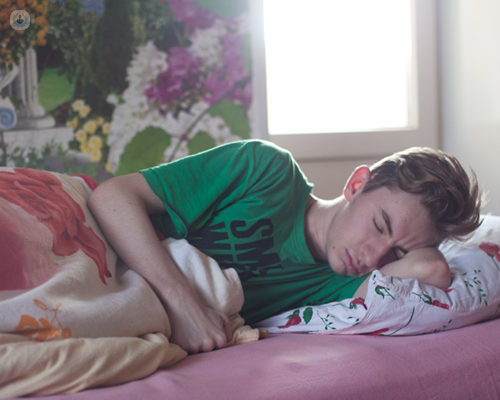How urgent is testicular pain?
Written in association with:When your child has testicular pain, it can be a scary and frustrating situation. You may have many questions, and one of those could be: ‘Is medical attention for testicular pain always necessary?’
Paediatric urologist Miss Marie-Klaire Farrugia speaks to Top Doctors about how testicular pain specifically affects teenagers, its causes and when it's time to see a doctor, in this reassuring and informative article.

What causes testicular pain in children/teens?
Testicular pain can be caused by conditions localised to the testis (scrotum), or may be pain referred from the tummy (i.e., a tummy condition whereby pain is felt in the scrotum). The most urgent cause to rule out is testicular torsion, whereby the testis twists on itself suddenly, blocking off its blood-supply resulting in severe pain. This condition requires emergency surgery to salvage the testis.
Other possible causes include:
- Infections;
- Small cysts;
- Inguinal hernia;
- Varicocele;
- Trauma;
- And very rarely, tumours.
Tummy issues such as appendicitis and kidney stones can sometimes manifest as pain in the groin and scrotum.
The most common infection in the scrotum is called an epididymitis, and affects a structure close to the testis. It’s treatable with antibiotics. All testes have a small cyst called an ‘appendix testis’ or ‘hydatid cyst’ lying at the apex of the testis, which does not have a function. This little cyst could also twist, and results in sudden onset pain. It tends to be self-resolving, although it is commonly discovered when testes are ‘explored’ surgically to exclude a testicular torsion.
Hernias will require non-urgent surgery to fix. Other rarer causes will be managed by a paediatric urologist depending on the diagnosis.
Is testicular pain normal during puberty?
Some boys feel occasional mild self-limiting discomfort, but ‘pain’ is not normal and medical advice is warranted.
Can testicular pain in children/teens pain be a sign of a serious condition?
Yes. Testicular pain may be caused by testicular torsion, which is a medical emergency. The pain is usually sudden in onset, severe, persistent, and may be associated with redness and swelling of the scrotum. These signs are red flags and immediate medical advice should be sought. testicular torsion is when the testis twists on itself, blocking off its blood supply, which could result in loss of the testis.
This situation is salvageable if surgery is performed within six hours of the onset of symptoms. Testicular torsion can happen at any age, but most commonly in teenage boys.
How urgent is it to get medical attention for testicular pain?
Severe testicular pain needs urgent medical attention, as a testicular torsion can only be salvaged if operated within six hours of the onset of symptoms.
What potential complications can arise if left untreated?
An untreated testicular torsion could result in loss of the testis. It can be very difficult to clinically distinguish between a torsion and other causes of testicular pain such as infection. Ultrasound scans are also often unable to distinguish, and can conversely delay urgent treatment. Therefore, the safest option is for an urgent ‘scrotal exploration’ - a small operation via the scrotum to check the testis and de-tort it if twisted, in order to re-establish its blood supply.
If you’re concerned about testicular pain in your child or teenager, arrange a consultation with Miss Farrugia via her Top Doctors profile.


